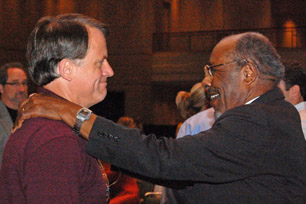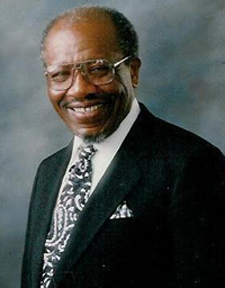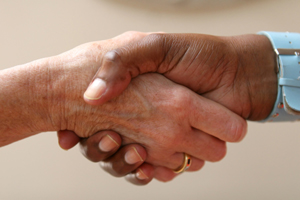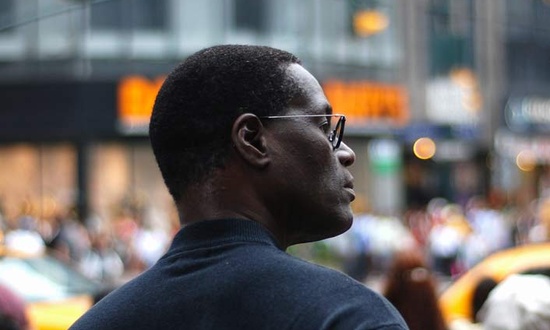 From Randy:
From Randy:
John Perkins is a sharecropper’s son who grew up poverty-stricken in Mississippi. Fleeing to California at age 17 after his older brother’s murder at the hands of a town marshal, he vowed never to return. But after coming to Christ in 1960, he did return to Mendenhall, Mississippi, to share the gospel of Christ.
John’s leadership in civil rights demonstrations resulted in repeated harassment, beatings, and imprisonment. He’s the author of many good books, but his book Let Justice Roll Down, first released 30 years ago, tells about the shaping events of his life. Reading of the torture he experienced at the hands of Mississippi police in the early 1970s, I wept through that book, as God spoke to me.
I have never been more deeply touched than in my first conversation with John at lunch in 1989 in Minnesota, at a writer’s conference at which we were both speaking. I saw in him a spirit of forgiveness and reconciliation that gave me great hope. John dropped out of school in third grade, but he is one of the wisest and sweetest men I have ever known.
When I chose to be involved nine times in civil disobedience in 1989, it was men like John Perkins who reminded me how small the price was compared to what others have paid. Thank you, Dr. Perkins, for your faithfulness. Let me recommend John’s ministry, the John M. Perkins Foundation for Reconciliation & Development, one of those we support with our book royalties.
Questions asked of Dr. Perkins by Lowell Noble, retired sociologist and theologian.
 How is justice central to creation?
How is justice central to creation?
How does it flow out of creation?
Justice is the foundation of God’s throne, and justice was the motivation for our redemptive process. The big question is, “How could God be just and justify you and me?” The redemptive story is the story of God coming down to bring justice for the unjust so that He might bring us back to God. Justice is inherited in the fact that He created us in His own image. It’s that own image that gives us the dignity and importance of humanity. The whole redemptive process and purpose of justice go together.
The story of the little boy and his ship is a good analogy. The boy had made a toy ship, which he lost. Later he found the ship in a toy shop. After seeing how much it cost, he went home, got the money and bought the ship back. He said, “Now you belong to me. You belong to me because I made you. You belong to me because I bought you back.” God made us and we sinned. Then through His death on the cross He purchased us, and now we belong to Him again. So justice is inherited in His creation of us.
Since we’re in a fallen world, how must we understand oppression before we can move toward justice?
We’ve got to understand the importance of humanity and the Biblical idea that we are to love our neighbors as we love ourselves. Justice is caring for humanity as we care for ourselves. We must use love, reconciliation and grace to uphold humanity’s dignity in Christ. Anything that uses pride, greed or selfishness to crush that inherent worth of humanity is sin and oppression.
We oppress people for our own selfish interests. You have to see oppressed people as created in the image of God, see their needs, and understand how and why they’re being neglected. In the story of the Good Samaritan, the priest and the Levite are the ones who ought to have had compassion, but their own self-interest was more important than the broken man. The Good Samaritan sees the situation and is moved with compassion and takes care of the person.
Exodus 6:9 talks about the children of Israel being so broken in spirit because of generations of oppression that they could not believe God when He said He was going to deliver them. How can lifelong or generations of oppression break or crush people’s spirits?
The Israelites would have rather gone back to live under the Egyptians’ enslavement. That shows the damage of people, and that is the misery of our people. They come to love their oppressor—in a sense—more than they love themselves. And that works itself out in our society, in terms of what we call self-hatred.
It worked itself out in black men in terms of self-hatred, of killing ourselves, of destroying ourselves. That’s the ultimate oppression—killing. The solution is to come alongside someone and nurture that person in love. That’s the key, but it’s still hard. When we say that we are talking about a social good, a redemptive good, it is counter to what our culture says. We are supposed to be self-focused. Jesus set a new model of being “other-focused.” We see this in the sacrifice of Jesus, His love for us, and the extremity of His love for us by His death on the cross. That’s a miracle story, and it’s that miracle power within that story that transformed my life.
We have to show people that God has an endless well of love for His creation and that no matter how long you have been oppressed, no matter the shame that you feel—you are still His child. This goes the same for whites who were slave owners. Through generations of being the oppressors they were damaged, too. The love of Jesus can break through that wall of guilt and redeem their lives.
 How do love and justice fit together? Many evangelicals talk about love, but they don’t tie it together with justice.
How do love and justice fit together? Many evangelicals talk about love, but they don’t tie it together with justice.
They’re really tied together in our care for humanity. John in his Gospel makes it known, “By this may all men know that you’re my disciples because of the love you have for each other.” We love Him because He first loved us. We see real love in Jesus. If we’ve been redeemed, it’s our responsibility to love others as we love ourselves. If we see our brothers destitute of daily food and don’t give them those things that are needed for the body, how does the love of God dwell in us? It’s a love not just in tongue, but in deeds and in truth. Jesus’ death on the cross was a physical demonstration of God’s love.
How should personal reconciliation and social justice be brought together?
Our redemption is bringing us back to serve God. God created us to be workers, and redemption is to work together with God. That’s what Paul is trying to explain—redemption. In Ephesians he says “for by grace are you saved through faith, and faith is not of yourself, but it is the gift of God. It’s not of our own good works, so no one can boast.”
The redemptive story was to redeem us to do good works. He’s going to ask us about our good works at the end of the age. He’s going to ask, “Did you feed the hungry? Did you clothe the naked?” It’s almost as if we’ve made Christianity into doing something else. We have personalized it, for our own redemption, but we haven’t applied it to the concrete society.
It is a question that we must continually ask ourselves: “Am I serving myself or God?” This leads to other questions of, “Am I an agent for justice?” “How have I been oppressive to my fellow brother and sister?” “Do I have a grateful heart to accept the grace that God has given us—that Jesus died for?” “In all things, have I loved?” We must continue to ask these questions and struggle with these ideas. As Christians isn’t it our call to be the prophetic voice about these issues to our culture, country and world?
The John M. Perkins Foundation for Reconciliation & Development is a nonprofit corporation organized for the sole purpose of advancing the principles of Christian community development and racial reconciliation throughout the world. For more information on the foundation, contact:
John M. Perkins Foundation for Reconciliation & Development
1831 Robinson St. • Jackson, MS 39209
(601) 354-1563 • www.jmpf.org
From Randy:
John Perkins is a sharecropper’s son who grew up poverty-stricken in Mississippi. Fleeing to California at age 17 after his older brother’s murder at the hands of a town marshal, he vowed never to return. But after coming to Christ in 1960, he did return to Mendenhall, Mississippi, to share the gospel of Christ.
John’s leadership in civil rights demonstrations resulted in repeated harassment, beatings, and imprisonment. He’s the author of many good books, but his book Let Justice Roll Down, first released 30 years ago, tells about the shaping events of his life. Reading of the torture he experienced at the hands of Mississippi police in the early 1970s, I wept through that book, as God spoke to me.
I have never been more deeply touched than in my first conversation with John at lunch in 1989 in Minnesota, at a writer’s conference at which we were both speaking. I saw in him a spirit of forgiveness and reconciliation that gave me great hope. John dropped out of school in third grade, but he is one of the wisest and sweetest men I have ever known.
When I chose to be involved nine times in civil disobedience in 1989, it was men like John Perkins who reminded me how small the price was compared to what others have paid. Thank you, Dr. Perkins, for your faithfulness. Let me recommend John’s ministry, the John M. Perkins Foundation for Reconciliation & Development, one of those we support with our book royalties.
Questions asked of Dr. Perkins by Lowell Noble, retired sociologist and theologian.
How is justice central to creation?
How does it flow out of creation?
Justice is the foundation of God’s throne, and justice was the motivation for our redemptive process. The big question is, “How could God be just and justify you and me?” The redemptive story is the story of God coming down to bring justice for the unjust so that He might bring us back to God. Justice is inherited in the fact that He created us in His own image. It’s that own image that gives us the dignity and importance of humanity. The whole redemptive process and purpose of justice go together.
The story of the little boy and his ship is a good analogy. The boy had made a toy ship, which he lost. Later he found the ship in a toy shop. After seeing how much it cost, he went home, got the money and bought the ship back. He said, “Now you belong to me. You belong to me because I made you. You belong to me because I bought you back.” God made us and we sinned. Then through His death on the cross He purchased us, and now we belong to Him again. So justice is inherited in His creation of us.
Since we’re in a fallen world, how must we understand oppression before we can move toward justice?
We’ve got to understand the importance of humanity and the Biblical idea that we are to love our neighbors as we love ourselves. Justice is caring for humanity as we care for ourselves. We must use love, reconciliation and grace to uphold humanity’s dignity in Christ. Anything that uses pride, greed or selfishness to crush that inherent worth of humanity is sin and oppression.
We oppress people for our own selfish interests. You have to see oppressed people as created in the image of God, see their needs, and understand how and why they’re being neglected. In the story of the Good Samaritan, the priest and the Levite are the ones who ought to have had compassion, but their own self-interest was more important than the broken man. The Good Samaritan sees the situation and is moved with compassion and takes care of the person.
Exodus 6:9 talks about the children of Israel being so broken in spirit because of generations of oppression that they could not believe God when He said He was going to deliver them. How can lifelong or generations of oppression break or crush people’s spirits?
The Israelites would have rather gone back to live under the Egyptians’ enslavement. That shows the damage of people, and that is the misery of our people. They come to love their oppressor—in a sense—more than they love themselves. And that works itself out in our society, in terms of what we call self-hatred.
It worked itself out in black men in terms of self-hatred, of killing ourselves, of destroying ourselves. That’s the ultimate oppression—killing. The solution is to come alongside someone and nurture that person in love. That’s the key, but it’s still hard. When we say that we are talking about a social good, a redemptive good, it is counter to what our culture says. We are supposed to be self-focused. Jesus set a new model of being “other-focused.” We see this in the sacrifice of Jesus, His love for us, and the extremity of His love for us by His death on the cross. That’s a miracle story, and it’s that miracle power within that story that transformed my life.
We have to show people that God has an endless well of love for His creation and that no matter how long you have been oppressed, no matter the shame that you feel—you are still His child. This goes the same for whites who were slave owners. Through generations of being the oppressors they were damaged, too. The love of Jesus can break through that wall of guilt and redeem their lives.
How do love and justice fit together? Many evangelicals talk about love, but they don’t tie it together with justice.
They’re really tied together in our care for humanity. John in his Gospel makes it known, “By this may all men know that you’re my disciples because of the love you have for each other.” We love Him because He first loved us. We see real love in Jesus. If we’ve been redeemed, it’s our responsibility to love others as we love ourselves. If we see our brothers destitute of daily food and don’t give them those things that are needed for the body, how does the love of God dwell in us? It’s a love not just in tongue, but in deeds and in truth. Jesus’ death on the cross was a physical demonstration of God’s love.
How should personal reconciliation and social justice be brought together?
Our redemption is bringing us back to serve God. God created us to be workers, and redemption is to work together with God. That’s what Paul is trying to explain—redemption. In Ephesians he says “for by grace are you saved through faith, and faith is not of yourself, but it is the gift of God. It’s not of our own good works, so no one can boast.”
The redemptive story was to redeem us to do good works. He’s going to ask us about our good works at the end of the age. He’s going to ask, “Did you feed the hungry? Did you clothe the naked?” It’s almost as if we’ve made Christianity into doing something else. We have personalized it, for our own redemption, but we haven’t applied it to the concrete society.
It is a question that we must continually ask ourselves: “Am I serving myself or God?” This leads to other questions of, “Am I an agent for justice?” “How have I been oppressive to my fellow brother and sister?” “Do I have a grateful heart to accept the grace that God has given us—that Jesus died for?” “In all things, have I loved?” We must continue to ask these questions and struggle with these ideas. As Christians isn’t it our call to be the prophetic voice about these issues to our culture, country and world?
The John M. Perkins Foundation for Reconciliation & Development is a nonprofit corporation organized for the sole purpose of advancing the principles of Christian community development and racial reconciliation throughout the world. For more information on the foundation, contact:
John M. Perkins Foundation for Reconciliation & Development
1831 Robinson St. • Jackson, MS 39209
(601) 354-1563 • www.jmpf.org
Photo by Clay Banks on Unsplash




